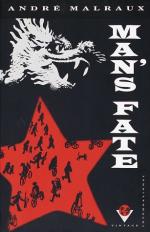|
This section contains 247 words (approx. 1 page at 300 words per page) |

|
Malraux's recreation of Chiang Kaishek's bloody break with the Communists places the reader in the throes of social revolution. As Malraux has stated on various occasions, however, the Chinese Revolution served as the novel's setting rather than subject. Like the two novels that preceded Man's Fate, the central focus is metaphysical, not social. The sociopolitical events depicted in this work — although critical to Malraux's aesthetic, since according to Malraux, it is in just such historical crises that man is able to transcend his existential isolation and alienation — are of minor concern compared to the conflict that is raging within the characters. Malraux refers to this inner turmoil as the "Pascalian aspect," namely, a profound metaphysical pessimism. The novel's impact on the reader lies precisely in its ambiguous stance concerning the existential human condition. Throughout, the reader experiences a tension that, on the one hand...
|
This section contains 247 words (approx. 1 page at 300 words per page) |

|




